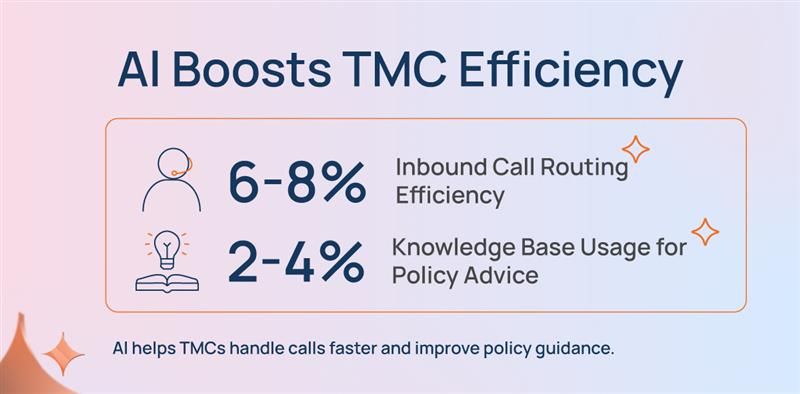Are Future-Ready Tools the Key for TMCs to Reset Corporate Travel Management?

In 2024, corporate business travel spending around the world recovered to almost $1.5 trillion, with companies implementing digital travel management solution, as reported by GBTA. Nevertheless, most Travel Management Companies (TMCs) continue to lag evolving traveler expectations, compliance requirements, and the demand for real-time cost transparency.
As the corporate travel landscape becomes more sophisticated, future-proof tools - from AI-powered booking assistants to integrated expense platforms - are transforming how TMCs work. They are no longer simply booking go-betweens; rather, becoming strategic tech partners that help organizations travel smarter, data-led, and sustainably.
The Evolution of TMCs: From Transactional Service to Strategic Partner
Historically, TMCs managed corporate travel logistics: flight, hotel, and car bookings and enforcing travel company policy. Although this function is still critical, the nuances of global business travel have broadened their mandate. Contemporary TMCs now incorporate sophisticated technology platforms to provide:
Data-Driven Insights: Historical travel information is used to predict trends, streamline travel budgets, and determine cost-saving areas. For instance, predictive analytics helps detect peak booking windows, enabling clients to save money by booking fares prior to price increases.
Personalized Traveler Experiences: AI is utilized to personalize travel suggestions based on individual employee likes, loyalty programs, and history, ensuring that the travel experience is frictionless and engaging.
Policy Compliance & Risk Management: Automated solutions enforce corporate travel policy compliance, highlighting exceptions in real time. They even send travel risk alerts to employees, ensuring safety on overseas trips.
This has progressed TMCs from administrative facilitators to strategic guides, aiding companies to maximize cost savings as well as employee happiness.
Harnessing AI and Automation for Operational Excellence
AI and automation are revolutionizing TMC operations from reactive service providers to proactive decision-makers. For example, American Express Global Business Travel (GBT) had stated that AI-enabled platforms had enhanced inbound call routing efficiency by 6-8% and had boosted the utilization of knowledge bases for policy advice by 2-4% (Source).

With AI and automation, TMCs are able to:
Automate Repetitive Tasks: Booking approvals, expense reporting, and changes to itineraries are processed automatically, allowing human agents to concentrate on more sophisticated or high-value activities.
Enhance Accuracy: Automation eliminates errors in expenses and bookings, keeping corporate travel policies and audit trails intact.
Offer Real-Time Support: AI chatbots and virtual assistants support travelers in real-time, from flight delays to policy explanations, to itinerary updates, and hence enhance the traveler's experience while minimizing administrative burden.
By embracing these technologies, TMCs enhance efficiency in operations as well as increase their value proposition to clients.
Data-Driven Decision Making with Business Intelligence
The contemporary business traveler generates huge volumes of information - from flight and accommodation reservations to expense reports. TMCs with business intelligence (BI) software can analyze this data and turn it into meaningful insights.
A BI dashboard can point out that a business is always overpaying for last-minute domestic airfares but could save 12-15% if reservations are made 4-6 weeks in advance. Likewise, tracking hotel reservations can identify ways to negotiate improved corporate rates with preferred vendors.
Cost Management Enhances: Insights provided by data enable businesses to put policies into practice that cut unnecessary expenses without impeding required travel.
Travel Forecasting Becomes Accurate: Predictive analysis foresees peak-demand times so that budgeting and planning can be done ahead of time.
Supplier Performance Is Tracked: Vendor reliability, price, and customer satisfaction metrics assist TMCs in recommending the most effective partners to clients.
Businesses that utilize data-driven intelligence through TMCs can attain financial effectiveness as well as strategic insight for managing travel.
Improving Traveler Experience Through Customization
Satisfaction of travelers is imperative in the modern corporate travel setup. Employees demand smooth, easy-to-use experiences akin to consumer-grade applications. Next-generation TMC tools provide this in the form of:
Personalized Recommendations: AI can recommend flights, accommodations, and transport based on individual tastes, loyalty membership, and organization policy.
Proactive Notifications: Gate change notifications, flight delays, or regional threats keep travelers up-to-date in real-time, minimizing anxiety and missed flights.
24/7 Virtual Assistance: Chatbots powered by AI offer immediate help, ranging from rescheduling a flight cancellation to explaining expense policies, making workers feel aided at each turn.
“Inconsistent service (41%) and poor tech functionality (36%) have been identified by global travel managers as major TMC friction points in need of improvement”, states Business Travel Magazine in a news article.
Experiential travel makes it easier for employees to follow corporate travel policies because the guidelines align with their personal preferences.
Scalability and Flexibility: Supporting Global Business Demands
As companies grow geographically, travel complexity escalates. Future-proof TMC technology offers the scalability and flexibility necessary to accommodate:
Growing volumes of travel: Automated systems process more and more bookings without extra administrative workload.
Varied corporate policies: Flexible platforms enable multiple departments or regions to have tailored travel rules without sacrificing centralized management.
ERP and HR Integration: T&E tools within enterprise systems enhance visibility into travel budgets, connecting bookings to finance, payroll, and employee information.
This flexibility ensures that TMCs continue to be effective business partners regardless of company size as travel needs change.
Industry Trends Driving TMC Adoption of Advanced Tools
Several key trends are shaping how TMCs are adopting and leveraging future-ready platforms.
Mobility-as-a-Service (MaaS): Integrating public transportation, ride-hailing, and conventional travel bookings into one platform enables employees to select the most efficient and sustainable route to work.
Sustainability Focus: Carbon-emission tracking tools that recommend sustainable travel options are becoming a growing priority as businesses make ESG commitments.
AI and Automation: AI not only looks beyond mundane tasks but anticipates traveler requirements, detects policy breaches, and delivers actionable intelligence for decision-makers.
Integration Across Platforms: Uniform connectivity between T&E software, ERP systems, and corporate portals provides unifying control and improved financial planning.
Reports from Fortune Business Insights estimate the global travel and expense management software market to grow from USD 4.08 billion in 2025 and reach USD 9.78 billion by 2032, exhibiting a CAGR of 13.3% during the forecast period.
Challenges in Implementing Future-Ready Tools
Though valuable, implementing sophisticated TMC platforms presents challenges:
Integration Complexity: Old systems can be difficult to integrate with new platforms.
Data Security: Maintaining sensitive traveler and corporate information is essential.
Change Management: Adoption by travelers and employees must be facilitated through training and support.
Implementation must be done with vendor selection, phased rollouts, and monitoring in mind.
Final Thoughts
The business travel environment is changing at breakneck speed, and TMCs that embrace future-proof tools are emerging as strategic partners and not just service providers. With the power of AI, BI, and automation, such platforms enable TMCs to:
- Optimize operations and save costs
- Enhance traveler experience and compliance
- Offer actionable insights and predictive analytics
As global business travel becomes increasingly complex, next-generation TMC platforms will be the distinction between reactive service providers and strategic, value-oriented travel management partners.
Looking for the right travel and expense software for your business travel management company? Connect to our subject matter experts today.
Disha Chatterjee
Senior Content MarketerIn this article
1.The Evolution of TMCs: From Transactional Service to Strategic Partner
2.Harnessing AI and Automation for Operational Excellence
3.Data-Driven Decision Making with Business Intelligence
4.Improving Traveler Experience Through Customization
5.Scalability and Flexibility: Supporting Global Business Demands
6.Industry Trends Driving TMC Adoption of Advanced Tools
7.Challenges in Implementing Future-Ready Tools
8.Final Thoughts



